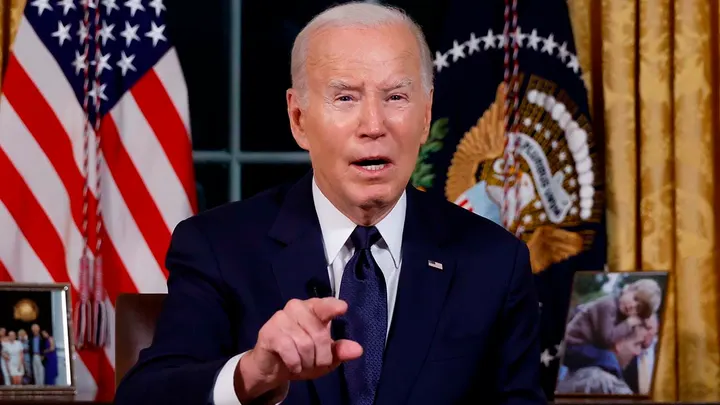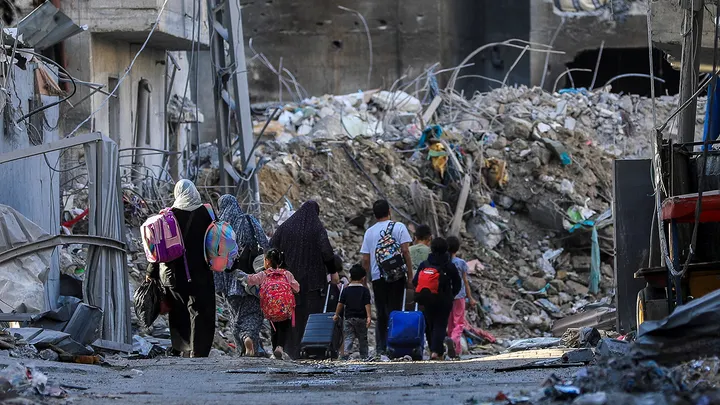Israel-Hamas isn’t the only example of Biden funding both sides of major conflicts
A widely shared meme illustrates Israel’s Iron Dome interceptors countering numerous Hamas rockets over a skyline.
Under the interceptors, one caption reads: “My tax dollars.” Under the Hamas rockets, another caption reads: “Somehow also my tax dollars.”
The humor in the meme reflects a tragic reality: as Israel confronts Hamas terrorists in Gaza following their October 7 attacks, President Biden finds himself financially supporting both sides of the conflict.
With overwhelming congressional support, the U.S. has consistently invested in the Iron Dome and other security cooperation with Israel across multiple administrations.
However, the Biden administration opted to reverse President Donald Trump’s reductions in taxpayer-funded assistance to the Palestinians. They resumed the practice of annually sending hundreds of millions in aid, including to the Hamas-controlled Gaza Strip, where aid is at risk of diversion.
US, allies are under surveillance by a North Korean spy satellite – with Kim threatening more
The State Department internally warned the incoming Biden administration about the “high risk” that “Hamas could potentially derive indirect, unintentional benefit from U.S. assistance to Gaza.” Despite this warning, President Biden resumed aid to Gaza.
In May 2021, I gained firsthand experience of this “high risk” when I visited Israel after its 11-day war with Hamas.

Prime Minister Benjamin Netanyahu and colleagues briefed me on how Hamas diverts aid using what the Palestinian terrorist group euphemistically calls “taxation” and other extortive means.
It was jarring to learn how Hamas steals water pipes and other civilian infrastructure to manufacture rockets that target Israel – a brazen weaponization of aid that Hamas recently bragged about in online videos.
When Secretary of State Antony Blinken recently appeared before the Appropriations Committee, I asked him whether he could guarantee that taxpayer-funded aid to Gaza was not used to help Hamas execute the Oct. 7 terrorist attacks. He repeatedly declined to make that guarantee.
Regrettably, this isn’t the only example of Biden funding both sides of major conflicts. Amid Israel’s war on Hamas, the U.S. has deployed two carrier strike groups to the region to deter Iran and its terrorist proxies like Hezbollah.

Yet, in recent years, Biden has also enriched Iran, which seeks nuclear weapons and is the world’s biggest state sponsor of terrorism, through non-enforcement of sanctions on Iranian energy exports. According to OPEC data, during Trump’s maximum pressure campaign, the Iranian regime’s revenue from illicit exports of crude oil and condensate totaled $19.4 billion in 2019 and $7.9 billion in 2020.
In contrast, Biden’s non-enforcement of sanctions beginning in 2021 allowed Iran to amass over $66 billion by the end of 2022, a number that is likely to exceed $100 billion by December 2023.
These figures do not include tens of billions in Biden-authorized sanctions relief and ransom payments to Iran since he took office.
The war in Ukraine is another example.
Biden has, thus far, provided $116 billion in aid to assist Ukraine in defending against Russia’s invasion. However, the administration is also indirectly funding Putin’s war machine by allowing Russia to continue exporting oil and gas under a price cap regime.
Despite initial decreases in Russian budget revenues due to Western sanctions, Russia found ways to circumvent them. In 2022, Russia earned even larger annual revenues from oil than in 2021, and oil exports at times exceeded pre-war levels.
It’s high time for Biden to end policies that allow the world’s worst regimes and terrorist groups to profit. In the Middle East, this means fully enforcing and expanding U.S.-led secondary sanctions on Iran.
It also involves embracing policies that ensure taxpayer-funded aid to Hamas-controlled areas does not benefit Hamas or any other Palestinian terrorists.
In Ukraine’s conflict, this means fully enforcing and expanding secondary sanctions to curb Russia’s energy exports, similar to the impact of Trump’s maximum pressure campaign on Iran.

Equally important, Biden must cease his opposition to domestic energy production and enable our nation to take a leadership role in international markets, as was achieved during the Trump administration.
When asked why Biden refused to fully enforce sanctions and allowed Iran to sell tens of billions in illicit oil exports, NSC spokesperson John Kirby inexplicably answered: “Supply and demand have to be balanced.”
The same logic of “avoiding destabilizing energy markets” also evidently guides the administration’s approach to Russia.
Let’s be clear: Biden’s opposition to domestic energy – with stringent environmental regulations, unprecedented rates of rejecting new oil leases, and threats to tax so-called “windfall profits” – destabilized global energy markets and drove prices up around the globe.
Now, we see the administration turning to Russia, Iran, and even Venezuela to “balance” the energy markets – all while inadvertently enriching our adversaries.
This is not how the leader of the free world should act. The preferable alternative is for energy markets to rely on American drillers rather than terrorist killers.
Oscar Wilde once said life imitates art. Under President Biden, U.S. foreign policy more frequently imitates memes. Yet, this tragedy is entirely avoidable.


